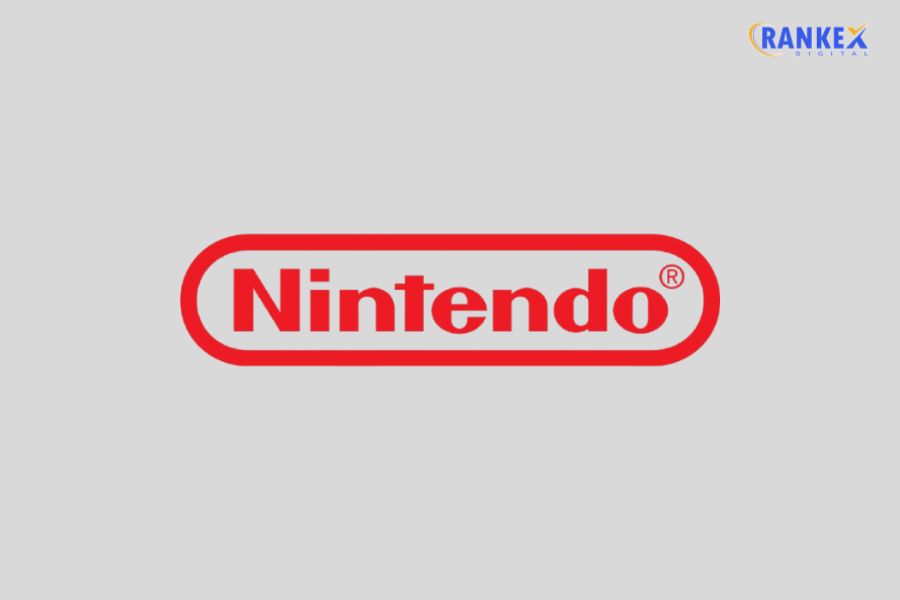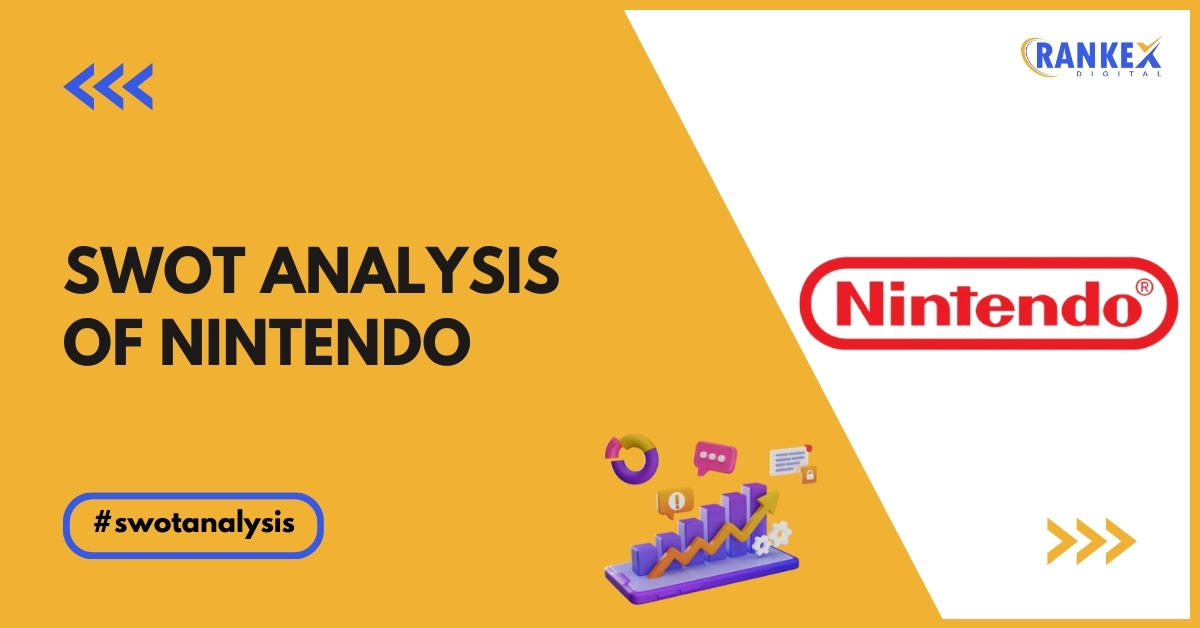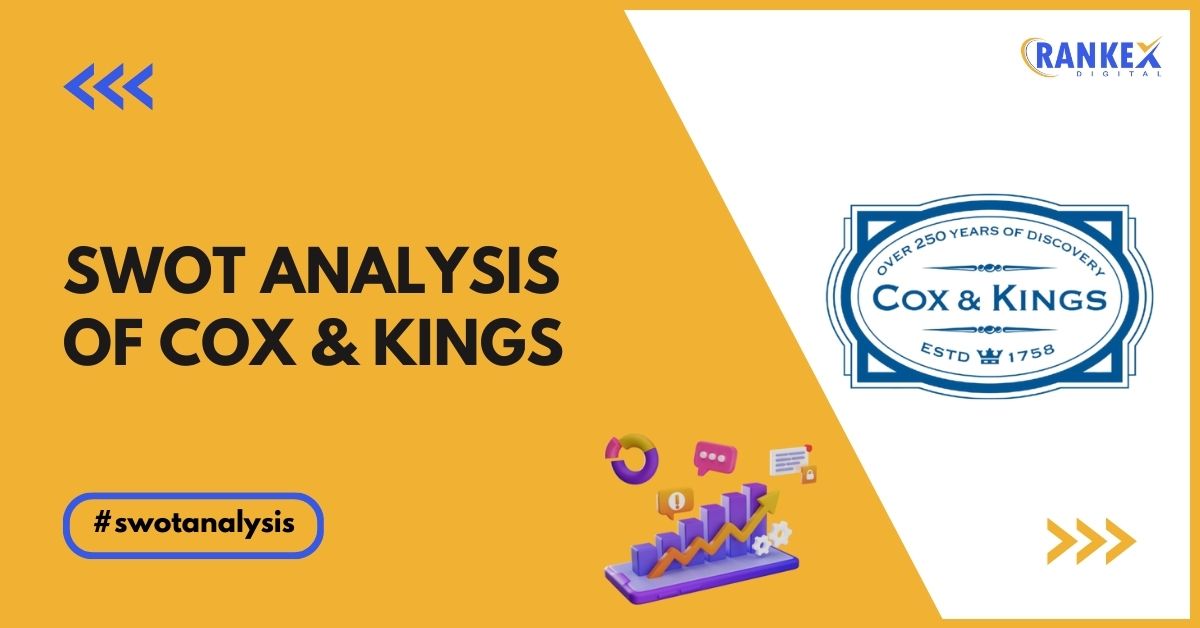Nintendo, a globally recognized leader in the gaming industry, has built a rich legacy with its innovative consoles, iconic characters, and pioneering game franchises.
From its early beginnings as a playing card company in the late 1800s to becoming a global gaming powerhouse, Nintendo has transformed the entertainment landscape.
This article delves into a detailed SWOT analysis of Nintendo, assessing its strengths, weaknesses, opportunities, and threats in the ever-evolving video game market.
Table of Contents
Overview of Nintendo

Nintendo Co., Ltd. was founded in 1889 by Fusajiro Yamauchi in Kyoto, Japan. Initially, it focused on producing playing cards, but by the 1970s, it pivoted to the video game industry, creating consoles that would revolutionize gaming worldwide. Over the years, Nintendo has introduced some of the most successful and beloved gaming franchises, including Super Mario, Zelda, and Pokémon.
Today, Nintendo continues to produce popular consoles such as the Nintendo Switch and is known for its wide range of games that appeal to a global audience.
Quick Stats About Nintendo
| Attribute | Details |
|---|---|
| Founder | Fusajiro Yamauchi |
| Year Founded | 1889 |
| Origin | Kyoto, Japan |
| No. of Employees | 6,200+ |
| CEO | Shuntaro Furukawa |
| Company Type | Public |
| Market Cap | $55.7 Billion |
| Annual Revenue | $13.8 Billion |
| Net Profit | $4.4 Billion |
Current News of Nintendo
- Switch Success: Nintendo continues to thrive with the Nintendo Switch, one of the most successful gaming consoles of all time.
- Expansion into Mobile Gaming: Nintendo has ventured into mobile gaming with successful titles like Super Mario Run and Animal Crossing: Pocket Camp.
- Virtual Reality Exploration: The company is exploring virtual reality (VR) and immersive gaming experiences.
- Partnerships with Third-Party Developers: Nintendo has been working closely with other game developers to bring high-quality third-party titles to its platforms.
SWOT Analysis of Nintendo
Strengths of Nintendo
- Iconic Game Franchises: Nintendo is home to some of the world’s most beloved game franchises, such as Super Mario, The Legend of Zelda, Pokémon, and Metroid. These franchises have stood the test of time, creating a loyal fan base across generations. The consistent release of high-quality games in these franchises helps Nintendo generate significant revenue and maintain its dominance in the gaming market.
- Innovation in Gaming Hardware: Nintendo has a track record of creating innovative gaming hardware that stands out from its competitors. The Nintendo Switch, for example, combines the best of both home console and portable gaming, which allows users to play anywhere, anytime. This unique approach has made it a popular choice for many gamers, setting Nintendo apart from PlayStation and Xbox, which focus primarily on home consoles.
- Strong Brand Loyalty: Over the years, Nintendo has developed a strong emotional connection with its customers. Many players grew up with Nintendo’s games, creating a sense of nostalgia and loyalty. This loyal customer base continues to support Nintendo, ensuring a stable market even as new generations of gamers emerge.
- High-Quality First-Party Games: Nintendo is renowned for its high-quality first-party games, which are exclusive to its consoles. These games, including titles like The Legend of Zelda: Breath of the Wild and Super Mario Odyssey, are often critically acclaimed and beloved by fans. These exclusive titles are a key reason why players continue to buy Nintendo consoles despite competition.
- Creative Game Development: Nintendo has a long history of creating innovative and creative games. Their focus on family-friendly content ensures they have broad appeal, catering to players of all ages and skill levels. Nintendo’s ability to create immersive and engaging gameplay experiences keeps their games fresh and popular.
Weaknesses of Nintendo
- Limited Third-Party Support: One of Nintendo’s recurring challenges is the lack of third-party support. While PlayStation and Xbox offer extensive third-party game libraries, Nintendo consoles sometimes miss out on big titles, especially those that require powerful hardware. Many game developers prefer working with Sony or Microsoft due to their more advanced technology, making it harder for Nintendo to compete in terms of game variety.
- Conservative Approach to Technology: Nintendo has traditionally chosen innovation over raw technical power. While PlayStation and Xbox regularly release consoles with state-of-the-art hardware, Nintendo often opts for less powerful, but more unique devices, like the Switch. This conservative approach can sometimes result in performance limitations, particularly in graphics and processing power when compared to more technologically advanced systems.
- Underperformance in Online Services: Nintendo’s online gaming services, including its Nintendo Switch Online platform, have often been criticized for being less sophisticated than those of its competitors. PlayStation Network and Xbox Live offer more stable, feature-rich online ecosystems, including more comprehensive multiplayer experiences and subscription services.
- Niche Market Focus: While Nintendo’s focus on family-friendly games has contributed to its success, it also limits its appeal to certain segments of the gaming market. More mature gamers or those who prefer realistic, action-packed titles might find Nintendo’s offerings too lighthearted or cartoony, which can limit their overall reach.
Opportunities for Nintendo
- Expansion into New Markets: Mobile gaming has seen explosive growth in recent years, with smartphones becoming a primary platform for casual gaming. Nintendo could capitalize on this market by expanding its mobile gaming portfolio, like it did with Super Mario Run and Pokémon GO. Additionally, virtual reality (VR) gaming is another avenue where Nintendo could innovate, offering immersive experiences that could complement its consoles.
- Collaborations with Other Companies: Nintendo has already taken steps in this direction, such as its partnership with Universal to create Super Nintendo World theme parks. Further collaborations with other companies—especially in media, merchandise, and gaming development—could provide new revenue streams and increase its brand presence.
- Increasing Digital Game Sales: With the rise of digital gaming, Nintendo has an opportunity to increase revenue from digital downloads and subscription-based services. As physical game sales continue to decline, Nintendo can bolster its digital ecosystem, which includes online stores and game streaming services.
- Next-Gen Console Development: Building on the success of the Nintendo Switch, there’s potential for Nintendo to develop a more powerful, next-generation console. A system that retains the Switch’s hybrid model, but with more advanced features, could appeal to both casual and hardcore gamers.
- Growth in eSports: The competitive gaming market, or eSports, has grown tremendously in recent years, and Nintendo could seize this opportunity. Games like Super Smash Bros. and Mario Kart are popular in the competitive gaming scene. With more focus on this area, Nintendo could tap into a rapidly expanding market of eSports fans.
Threats to Nintendo
- Intense Competition: Nintendo faces fierce competition from Sony and Microsoft, both of which have more powerful consoles and broader third-party support. This makes it challenging for Nintendo to maintain market share, especially as gamers who prefer high-end graphics and processing power may lean toward PlayStation or Xbox.
- Market Saturation: The console market is becoming increasingly saturated, particularly in the current-generation era. As sales of devices like the Nintendo Switch begin to level off, growth in hardware sales becomes more challenging. This also limits the opportunity for massive growth in console adoption.
- Changes in Consumer Preferences: As gaming habits evolve, consumers are increasingly turning to mobile gaming or cloud-based gaming services, where devices like smartphones, tablets, or PC-based services like Xbox Game Pass are becoming more common. This shift away from traditional consoles could impact Nintendo’s business model.
- Economic Downturns: Like many entertainment industries, gaming is vulnerable to economic downturns. During recessions, people tend to cut back on discretionary spending, and gaming consoles and games are often considered non-essential purchases. A significant downturn could hurt Nintendo’s sales.
- Copyright and Licensing Challenges: Nintendo’s iconic intellectual properties, such as Mario and Zelda, make it a target for piracy and counterfeit products. As Nintendo’s revenue is highly dependent on the strength of these franchises, the risk of piracy, counterfeiting, and licensing violations poses a threat to both its revenue and brand reputation.
Conclusion
Nintendo’s SWOT analysis reveals a strong brand with legendary franchises, an innovative approach to gaming hardware, and a loyal customer base.
However, its weaknesses, such as limited third-party support and underdeveloped online services, pose challenges.
The company has ample opportunities to expand into new markets, enhance its digital offerings, and invest in emerging technologies. Yet, intense competition and market saturation remain significant threats.
By leveraging its strengths and embracing new opportunities, Nintendo can continue to thrive and maintain its position as a leading player in the global gaming industry.
Frequently Asked Questions
What makes Nintendo’s gaming consoles unique?
Nintendo’s consoles, such as the Switch, are unique because they offer hybrid functionality—allowing players to enjoy both home console gaming and portable gaming. This innovation has set Nintendo apart from its competitors.
Why are Nintendo’s first-party games so successful?
Nintendo’s first-party games, like Super Mario and The Legend of Zelda, are successful due to their high quality, innovative gameplay, and strong fan loyalty. These franchises have become cultural icons, ensuring sustained popularity.
How does Nintendo handle competition from Sony and Microsoft?
Nintendo competes with Sony and Microsoft by focusing on its strengths: innovative gaming experiences, family-friendly content, and beloved game franchises. While it doesn’t match the raw power of its competitors’ consoles, its unique offerings attract a broad, loyal customer base.
Does Nintendo plan to enter the VR or AR market?
Nintendo has shown interest in exploring virtual reality (VR) and augmented reality (AR), but it has been cautious in embracing these technologies. Their emphasis is on creative and unique gaming experiences, which could lead to future VR/AR developments.
What challenges does Nintendo face in the future?
Nintendo faces several challenges, including increasing competition from Sony and Microsoft, the rise of mobile gaming, and evolving consumer preferences. Additionally, market saturation and economic fluctuations could impact its sales and growth in the gaming industry.











